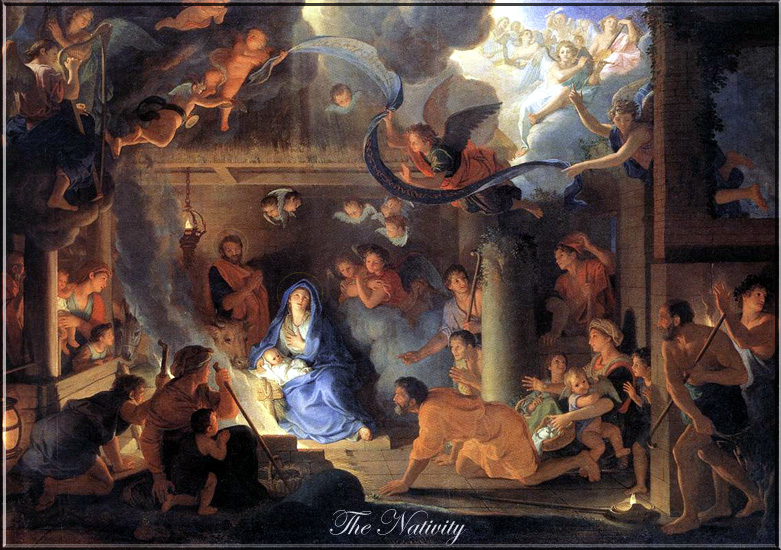
And the shepherds came with haste; and they found Mary and Joseph, and the Infant lying in the manger.

St. Francis of Assisi, the founder of the Franciscan Order, was the first to
begin the tradition of singing Christmas Carols in the 13th century with the introduction of Nativity Plays. Up to this time, Catholic antiphons and hymns were confined to choirs who sang the liturgy during the Christmas Season.


Angels we have Heard on High Angels We Have Heard on High is a French Catholic carol based on a earlier carol known as Les Anges dans nos campagnes ( "Angels in our countryside") from an unknown author. The most common English version was translated by a Roman Catholic Bishop, James Chadwick, of Hexham and Newcastle in England in 1862. A Catholic favorite ever since, the carol brings to light the Annunciation of the Shepherds that calls them to the stable in Bethlehem. 

Oh Come, All ye Faithfull ** "O Come, All Ye Faithful" or in Latin "Adeste Fideles" is one of the most beloved of all Christmas Carols. St. Bonaventure has been attributed as the author of the lyrics dating back to the 13th Century. The first manuscript that contains both words and music was signed by John Francis Wade, a Catholic layman, who fled religious persecution in England in the 18th Century. 

Silent Night "Silent Night" or "Stille Nacht! Heilige Nacht" in its original German, was composed by an Austrian headmaster and musician named Franz Xaver Gruber. However, Franz Gruber did not write the lyrics for the piece. The original lyrics or poetry for Silent Night were written by an associate priest at St. Nicolas Church in Oberndorf, Austria. Joseph Mohr composed the words for Silent Night in 1816, whilst he was on a pilgrimage at a small church in Mariapfarr, Austria. 

O du Fröhliche "O du frohliche" is very popular German Christmas carol that has Italian origins, the melody of which is from the Latin hymn "O Sanctissima." 

Coventry Carol The "Coventry Carol" is a Christmas carol dating from the 16th century. The carol was performed in Coventry in England as part of a mystery play called The Pageant of the Shearmen and Tailors. The play depicts the Christmas story from chapter two in the Gospel of Matthew. The carol refers to the Massacre of the Innocents, in which Herod ordered all male infants under the age of two in Bethlehem to be killed. The lyrics of this haunting carol represent a mother's lament for her doomed child. 

Wexford Carol The Wexford Carol (Irish: Caroel Loch Garman) is a traditional religious Irish Christmas carol originating from County Wexford, and specifically, Enniscorthy (whence its name), and dating to the 12th century. The subject of the song is that of the nativity of Jesus Christ. The song is sometimes known by its first verse, "Good people all this Christmas time." 

A la Nanita Nana * "A la nanita nana" is a traditional Christmas time carol sung in honor of Baby Jesus, originating from Spain in the 18th century. 

Gesu Bambino "Gesu Bambino" is an Italian Christmas carol composed by Pietro Yon in 1917. It was translated to English by Frederick H. Martens. The melody and lyrics of the chorus are derived from that of "O Come All Ye Faithful". 

Away in a Manger Martin Luther was erroneously credited with this beautiful hymn of the baby Jesus. This Christmas carol, that has received such acclamation as a beloved tribute to the Divine Savior, was never listed in the works of Luther and in his own words most of the Lutheran hymns were plagiarized from the Catholic Church. To this day, the true author of Away in a Manger is unknown. 

Le Divin Enfant * Il est ne, le divin Enfant (English: He is born, the divine Child) is a traditional French Christmas carol dating from the mid 19th century. The lyrics of this carol detail the birth of Jesus and the wait of 4000 years for the event, as told by the prophets. It also calls on the Kings of the Orient to attend the child. 

Lulaj Jezuniu (Sleep Little Jesus) A touching 17th century Polish Lullaby. It's words are simple and convey the motherly love of the Virgin Mary toward the baby Jesus. Some of the lyrics of this touching melody are: 1. Lulaj little Jesus, pearl most treasured, Lulaj little Jesus, fondness unmeasured. Refrain: Lulaj little Jesus, lulling and sighing, And you, His Mother dear, save Him from crying. 2. Close your tear-stained eyelids, weary from weeping, Calm your quivering lips, that keep you from sleeping. Refrain: Lulaj little Jesus, lulling and sighing, And you, His Mother dear, save Him from crying. 

Still , Still, Still "Still, Still, Still" is an Austrian Christmas carol and lullaby. In German its first line is "Still, still, still, weil's Kindlein schlafen will!" (Hush, hush, hush, for the little child wants to sleep!) 

O Holy Night Adolphe Adam composed the Christmas Carol Cantique de Noel to the French poem Minuit, Chretiens or (Midnight Christians) by Placide Cappeau who wrote the poem at the urging of his parish priest. The original French edition is a thoroughly Catholic Carol as it reflects the birth of Christ and the Redemption of mankind. Also called by its English title, O Holy Night, it became an international favorite and was reportedly the first musical broadcast on radio. Adolphe Adam received a Roman Catholic burial after his death May 3, 1856. The additional Christmas Carol playlist from our home page can be listened to by clicking on the link below:  Home Page Catholic Harbor Christmas Videos: Videos may take several minutes to download completely Additional Christmas Carols: Wexford Carol Gesu Bambino Noel Nouvelete First Noel Mary Walks Amid the Thorn Christmas Prayers and Devotions with Music: Children Prayers for Christmas The Angel Gabriel Devotions to the Infant King Christmas Eve The Nativity Christmas Day Prayers and Devotions The Christmas Creche of St. Francis of Assisi The Story of Silent Night Video * This work is in the public domain in the United States because it is a work prepared by an officer or employee of the United States Government as part of that person's official duties under the terms of Title 17, Chapter 1, Section 105 of the US Code http://catholicharboroffaithandmorals.com/ |